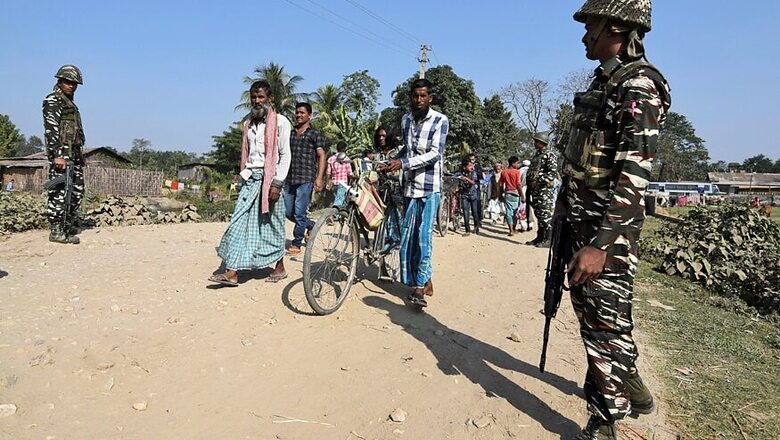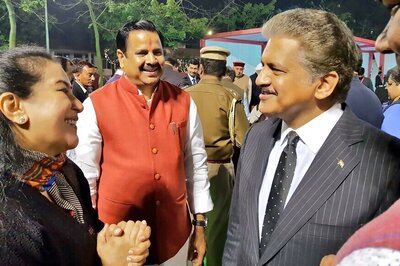
views
New Delhi: As Assam released the part of the draft NRC at the stroke of midnight on December 31 with 1.9 crore names in the list, but almost 20,000 people would certainly not find their names on the list anymore.
In a reply to a question in the Lok Sabha, Minister of State of Home Affairs, Kiren Rijiju said that almost 19,612 doubtful voters were declared as foreigners by the Foreigners Tribunal of Assam till October 2017.
Leader of All India United Democratic Front, Badruddin Ajmal, questioned Rijiju about the details of the procedure adopted to declare a person as a doubtful voter and how many such doubtful voters were declared as foreigners by the Foreigners Tribunal (FT).
“As per the monthly report of disposal of cases in FT of Assam, 19,612 'D' (doubtful/disputed) voters were declared foreigners till October 2017,” informed Rijiju on Tuesday.
However, the MoS Home Affairs stated that “issuing notice to ‘D’ voters is a legal process and there is no question of harassing people. ‘D’ voters are not detained and only people declared as foreigners are kept in detention centres,” said Kiren Rijiju.
As per the white paper on foreigners issue, released by Assam government's Home and Political Department during intensive revision of electoral rolls in Assam in 1997, the letter 'D' (for doubtful/disputed) was marked against the names of those electors who could not prove their Indian citizenship status at the time of verification.
It was only based on the verification report that the Electoral Registration Officers (EROs) decided on whether the matter needed to be referred to an FT to ascertain the Indian citizenship status of such electors.
The Union Minister said that once EROs decided to send such cases to tribunals, such cases were forwarded to the competent authority (Superintendent of Police of the concerned district) for reference to the concerned tribunals.
"Based on the judgments/orders of the tribunals, the letter 'D' was either removed if Indian citizenship status was confirmed or name of the electors deleted from the electoral rolls if citizenship status as Indian could not be established in court," he said.
In 2011, the Gauhati High Court ordered the ‘D’ voters to be transferred to Foreigners Tribunals set up under Foreigners Tribunal Order 1964 and be kept in detention camps. The Bengali Hindus who migrated from East Pakistan and Bangladesh before and after 1971 are mostly affected by this categorization.
However, now the only route available for these people declared as foreigners would be to approach a High Court or the Supreme Court which will have the authority to overturn the verdict of the foreigner tribunal.
Aman Wadud, a lawyer who has been working closely in the NRC case at the apex court and the Gauhati High Court, told News18 that “police would now search for these people declared as foreigners to detain and deport, but Bangladesh would never accept them as they are not Bangladeshis.”
“These people would never find their names in the NRC. Only higher courts can overrule the decision of the tribunal, but it is very unlikely that verdicts would be delivered in such short span of time. Most of these people are Indians and their documents have now been rejected because of minor anomalies in the documents. The rule is to detain and deport but Bangladesh would never accept them. So, now either they are detained and kept in detention forever or remain in hiding. Police would be searching for them now,” said Wadud.
Wadud also mentioned that the figure presented by the Union Minister was a “consolidated figure” and that around “2,000 to 3,000 have received respite from the higher courts.”
“The real figures of ‘D’ voters being declared as foreigners is much higher. But out of the figure cited by Rijiju. Almost 2 to 3,000 have received relief from higher courts often including ex-parte decisions too,” said Wadud.
One such case was of Moinal Mullah who had received a notice to prove his citizenship. Owing to his poverty and illiteracy, he could not represent himself in the Foreigners Tribunal and was declared a foreigner. Mollah moved theigh Court, but there was no respite. Later, there was an appeal in the Supreme Court and the SC declared him as an Indian citizen. But the ruling came after Mollah languished for years in jail.



















Comments
0 comment